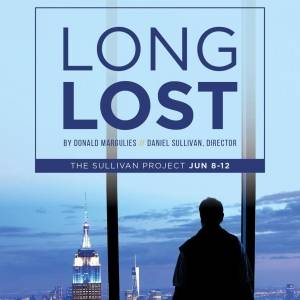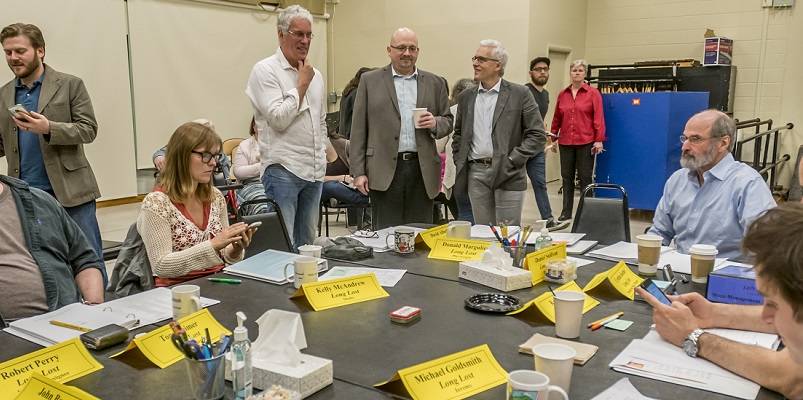A Tony Award-winner, a Pulitzer Prize-winner, and four fairly famous stars (half of which are named Kelly), walk into a black box theatre – and you may have heard this one before because I can’t stop talking about it. As reported previously, this week will bring an extraordinary opportunity to those of us who haven’t deserted C-U in the summertime. The Sullivan Project is bringing the newest play by Donald Margulies, Long Lost, to Krannert Center’s Studio Theatre for a full production.
 The Sullivan Project is an initiative driven by Daniel Sullivan, with the mission statement to “gather professional artists from across the country to produce a new play under the aegis of Illinois Theatre.” Its first project, Lost Lake by David Auburn, was realized in early 2014, and if you can’t tell from his non-review, my predecessor was colored very impressed.
The Sullivan Project is an initiative driven by Daniel Sullivan, with the mission statement to “gather professional artists from across the country to produce a new play under the aegis of Illinois Theatre.” Its first project, Lost Lake by David Auburn, was realized in early 2014, and if you can’t tell from his non-review, my predecessor was colored very impressed.
For some reason, back then, Smile Politely didn’t have the opportunity to run pre-press on the project. For some entirely more amazing reason, this time we can, and I was offered a chance to interview a Pulitzer Prize winner. Of course I took it, and the playwright himself took some time out of his very busy day to answer my rudimentary questions about his script and this process.
Smile Politely: I’m sure you’re anticipating my first question, which is to beg of you to tell me any more about the play. (actual begging ensues)
 Donald Margulies: (laughing) Beyond the press release, you mean?
Donald Margulies: (laughing) Beyond the press release, you mean?
SP: Yeah, all I have is that it’s about a reunion between two brothers whose relationship is troubled.
Margulies: It’s a family play, it’s really about the return of a sort of problematic brother, who shows up one day after a period of years of estrangement. He appears, returns into the life of his more successful younger brother, and the brother’s family, his wife and son. It’s really about the encounter over the stasis. It takes place over the course of one long day, and then an epilogue. And it really explores, sort of the extent to which good people can accept those closest to them who are terribly flawed. I think that all families have their troubled family members who tend to challenge the empathy of those who love them.
SP: Oh, well, that definitely describes me. Is that you, or are you writing from the outside of this one?
Margulies: I think we all have families and intimate friends, I think we’ve all found ourselves in situations where our friends sort of tax us; they deplete our capacity to be compassionate. In a way, I think the play is really about the limits of compassion.
 SP: That description makes me wonder: is the setting relevant? I know most of your plays focus on big-city life, is that what we can expect, or is this more of a departure for you?
SP: That description makes me wonder: is the setting relevant? I know most of your plays focus on big-city life, is that what we can expect, or is this more of a departure for you?
Margulies: It is set in New York, but I do think that the scenes revolving around family members are really universal. It may be a specific urban setting, but it’s a dynamic that people from all walks of life could relate to. Vocabulary, references will be a little different, but I think the underlying struggles between these people will be something all people will identify with.
SP: So you’re here, in Champaign-Urbana, because of Daniel Sullivan and the Sullivan Project, and he’s a long-time collaborator, I’ve discovered, involved in …six of your plays? I’m not too familiar with the process, how things happen on Broadway: were you working with him, together, when your plays were premiering? Was that a process you were involved in, or was it more that he took the script and ran with it as the director?
Margulies: Oh no, we worked closely. Daniel and I have been working together for about 18 years. I’ve developed new work with him — by developing I mean that we would workshop plays together, have readings of plays together, and then go into rehearsal with these plays. Over time, we’ve developed a tremendous cooperative collaboration, a kind of shorthand that we enjoy. Working with Dan is one of the great joys of my professional life. When he invited me to come to Champaign-Urbana, with the new work, it really gave me the [impetus] to get started on a new play, so I could get back into the rehearsal room with Dan.
SP: And this play is so new, it’s only been read at a festival in Nashville, just a table-read of a script barely two weeks old?
Margulies: The Nashville Repertory Theatre approached me about a fellowship called the Ingram New Works Fellowship. The festival promotes new playwrights and established writers partner with less experienced writers. Part of the festival is the visiting playwright showing new work. So I premiered the first 50 pages of Long Lost — about 1/3 of what I currently have — a year ago May. I’ve been developing it, working on it ever since, and we went into rehearsal here around May 17th. I continue to do a lot of cutting and pruning and rearranging, and that process goes on every day.
SP: I was going to ask if you’ve seen any major changes to the script since getting actors into rehearsal this May.
Margulies: Yeah, wow, well, the play is probably about 20 pages shorter than it was the first day of rehearsal. That’s a lot of pages.
(That is a lot of pages, to give you an idea, the 50 pages that were read in Nashville clocked in at 3 scenes and 45 minutes. So 20 pages is at least 15 minutes of play, if not more. – ed)
 Margulies: Not that it was overlong, the kind of tweaking that I am accustomed to doing is really kind of pruning syllables, getting more familiar with the rhythms of the characters’ speech patterns. Sometimes I find I’ve used far too many syllables to express a single thought. So the kind of work I’ve been doing is really pruning. When you begin to add up all these syllables, all the sudden you’ve got 20 pages’ worth. It’s been fun, really fun, and it helps to work with all these terrific actors.
Margulies: Not that it was overlong, the kind of tweaking that I am accustomed to doing is really kind of pruning syllables, getting more familiar with the rhythms of the characters’ speech patterns. Sometimes I find I’ve used far too many syllables to express a single thought. So the kind of work I’ve been doing is really pruning. When you begin to add up all these syllables, all the sudden you’ve got 20 pages’ worth. It’s been fun, really fun, and it helps to work with all these terrific actors.
 […]I have to say that all four characters are remarkably well-cast. When you have a successful ensemble, they just become a kind of family, and that doesn’t always happen, but it seems to have happened here. It makes rehearsal time just that much more pleasurable, because you can see actors taking pleasure in their fellow actors’ scenes, even ones they’re not in. That’s always a nice measure of how well an ensemble has come together.
[…]I have to say that all four characters are remarkably well-cast. When you have a successful ensemble, they just become a kind of family, and that doesn’t always happen, but it seems to have happened here. It makes rehearsal time just that much more pleasurable, because you can see actors taking pleasure in their fellow actors’ scenes, even ones they’re not in. That’s always a nice measure of how well an ensemble has come together.
SP: What do you think you, as a writer, will get from this full production for sale to the general public, as opposed to workshopping or table reads?
Margulies: Particularly in today’s theatre, which is much more cost-conscious and conservative in terms of budget, it’s rare that a brand-new play would be given even a rudimentary run-through, let alone a full production. It’s a great way to see a play, see it on its feet, see it come alive without scripts in hand. It’s a great opportunity, particularly to do it in a university setting where you don’t have to worry about critics or bloggers, I hope…
(emphasis his; if we’d been in person, I’m sure I’d be on the receiving end of some side-eye — ed.)
…who are weighing in too early or snarkily …
SP: I just want to say that I have been forbidden from reviewing, but if I did, I would encourage people to go just for the experience of seeing a play being born from such incredible parents, as it were.
Margulies: Well that’s very nice of you, thank you. But I think [we’ll] get a greater sense of the effect it will have on its audience, which is a useful thing. You can’t quite imagine when actors are sitting around a table; plays don’t fully come alive until they’re performed. Play scripts are really blueprints for actors, and until those actors are free from the constraints of holding a script, manage to disappear into their characters and let their characters behave with one another, that’s the opportunity for the work to come alive and costumes and tech and all of that combines exponentially into the experience. The physicalized potential is really valuable: it’ll give a sense of where it’s problematic, where it’s working well, where it needs to be fleshed out, that kind of thing. I’m sure I’ll do more work on the play after this point, but we’ve gotten a lot of good work done in just the past two weeks. And we’ll see what’s next in store for the life of Long Lost after Champaign-Urbana.
SP: And are there plans in place? Broadway? Off-Broadway? Paris?
Margulies: (laughter) No, I don’t, I just want to experience this and then figure out where we want to take it after that. But it’s really been fun. Everybody associated with the theatre department and the Sullivan Project has just been lovely people. We’re getting a tremendous support system here.
=====
Whether you are a theatre-nerd about to lose your shit for seeing the gestation of drama via the gestalt of brilliant people, or a townie who appreciates the fact that we’re extremely lucky to get big opportunities in this little place, or just someone who is looking for something to do of an evening just like any other evening except hotter: I encourage you to take advantage and go see Long Lost at Krannert. Even if you’re here in two years when the next Sullivan Project comes around, it won’t be the same script or talent. This is literally unique, don’t regret not going.
Long Lost runs from Wednesday, June 8th through Sunday, June 12th at 7:30 p.m. with matinees at 2 p.m. on Saturday and Sunday. Tickets start at $25 with the usual Krannert matrix of discounts, see website for details. Purchase tickets online, at the ticket booth, or by calling 217-333-6280. Be advised, the play does contain adult content.
Banner photo by Darrell Hoemann
About Rebecca Knaur…
As Arts Editor for Smile Politely, rk would cop to grabbing all the best interviews for herself, but fortunately with all the students gone, there weren’t many takers. If you want to write for SPArts, email her; if not, follow @rknaur on Twitter.









 About Rebecca Knaur…
About Rebecca Knaur…